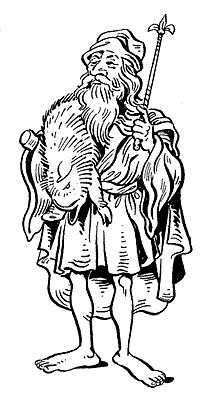Tiwesdaeg, an Anglo-Saxon Name for Tuesday
Tuesday, Tiwesdaeg (Tiw’s day) was named for Tyr, the Norse god of war and battle.
- In the Germanic religion, Tyr (Tiw) was thought of as the “bold wrestler” of the gods.
- The Roman name for this day was dies Martis, “day of Mars”, their god of war.
- In Teutonic mythology, he is said to be a son of Odin and Frigga, and the bravest of all the gods.
- The ancient southern Germans gave him the name Ziu while the northern Germans called him Tiuz.
- The Scandinavians called him Tyr and the Anglo-Saxons Tiw.
- It is generally believed that all of the Germanic names correspond to the Sanskrit dyaus, the Greek Zeus and the Latin Deus.
- If these etymological sources are accurate, then the Germanic names for the god must come from a common Indo-European name which began by simply signifying “divinity”.
- Later his name meant “sky god”.
- In modern German, his name means “thing” from which the German Tuesday, Dienstag, is derived.
- It is probably Tiw who is referred to in a Latin inscription on a Roman altar discovered at Housesteads in Northumberland, near Hadrian’s Wall.
- This altar dates from the third century and was erected by German soldiers serving with the Roman legions.
- It bears this Latin inscription: Deo Marti Thincso et duabus Alaisiagis Bede et Fimmiline et numini Augusti Germani cives Tuihanti v. s. l. m. (votum solverunt libenter merito) or “To the god Mars Thincsus and to the two goddesses Alaisiages Beda and Fimmilina and to the majesty of the divine Augustus, the German citizens of Twenthe address this merited homage.” (The province of Twenthe was north of the Rhine on the present frontiers of Holland and Germany).

- The epithet Thincsus shows that Tiw was considered in the same category as Mars who presided over the “thing”, the term used for the assembly where discussions of the community were regulated according to law.
- Tiw’s “spear” is less a weapon than a sign of judicial power and authority.
- Tyr, another name for Tiw, is supposed to have been extremely brave and it was often he who awarded victory to one of the sides engaged in battle; it was thought to be a wise idea to pray to him when going into combat.
- Tyr and Woden formed a pair which is found elsewhere among the Indo-European people: the one-handed and the one-eyed, the man of law and the man of magical “fury”.
- The illustrated story of how Tiw lost his right hand may be seen by going to Tiw and Fenris for this myth from the mist.
Living is entirely too time-consuming.
—Irene Peter  You may return to the main lists of months and years from here.
 FREE searches FREE searches of words derived from Latin and Greek sources.
 Free Focusing on Words Newsletter subscription form.
 E-mail Form E-mail Form for comments or type in words@wordquests.info, if you prefer.
|

